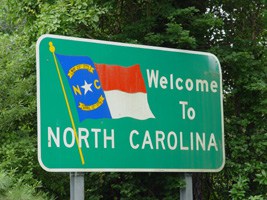 This week, StoptheCap! will be paying extra attention to the events in North Carolina, as the state legislature continues its review of two bills that would effectively end municipal broadband competition across the state. Competition is a key asset in dealing with rogue corporate providers that leverage the lack of competitiveness in a market with high prices and comparatively bad service. Time Warner, among other incumbent providers, have been heavily engaged in trying to stop municipal competition before it spreads around the state.
This week, StoptheCap! will be paying extra attention to the events in North Carolina, as the state legislature continues its review of two bills that would effectively end municipal broadband competition across the state. Competition is a key asset in dealing with rogue corporate providers that leverage the lack of competitiveness in a market with high prices and comparatively bad service. Time Warner, among other incumbent providers, have been heavily engaged in trying to stop municipal competition before it spreads around the state.
If you are a resident of North Carolina, this is your action week. Without the potential threat of municipal broadband, big providers can keep your access capped, metered, and slow. Threaten them with the potential of competition, and your access to the latest broadband technology is a much safer bet.
If you are outside of North Carolina, you should still be paying close attention to this issue. If your community is stuck with a single provider of fast broadband threatening to impose profit parties through caps and metered billing, and the other provider in town offers slow service, is unavailable, or threatens to cap as well, municipal broadband is a mighty powerful sword to wave at bad actors. Protecting the ability to build such a system requires vigilance from bad legislation hand-written by big cable and their lobbyist friends to ban or restrict this tool.
Get involved, for your own sake, even if your local community doesn’t have a system on the drawing board… yet.


 Subscribe
Subscribe
I’m an avid reader of StopTheCap, even though I’m not a customer of Time Warner or AT&T (DSL). I’m a Comcast customer and even though caps is very bad, I didn’t have any problems with 250GB cap from Comcast.
You should not settle for a cap even it you are not reaching it now. More and more media is being delivered via the internet and eventually your household will get to that cap and break it. My kids and I would break through that 250GB on our third week in a month. We are technology driven thanks to me and we enjoy all the internet offers. This last weekend we watched 4 movies from Netflix. They were older titles that are no longer showing on cable and we don’t own. We use Netflix to watch a movie before we… Read more »
Hey, me too. I wouldn’t settle for a cap either, but my household does not use a lot of bandwidth, except for me, as I do tend to download Linux distros, such as Ubuntu and openSUSE.
I hardly go over 100GB, but even though now and in the future, 100GB may be too little, depending on how much content we watch over the Internet. I might hit up to 200GB, but won’t go beyond that until when future comes when speeds get increased after cable companies upgrade to DOCSIS 3.0.
Five years ago none of us used anywhere near as much data as we do today. It would be interesting to see how much the average data usage has risen over the past 5 years. In the next couple of years the growth of the internet will not cease. Watching more and more HD video will use more and more data. Accepting caps now will mean you pay more later. Caps and tiered pricing are nothing short of money grabbing and product protection for cable providers. I think cable providers should be forced to separate their internet and cable services.… Read more »
T.M. My comment is not aimed at you but rather all the readers here. In a way they are already separated. One is called TW the video end the other TWC the internet end. Because how you separate them or what they would call themselves in the end they still would feed each others interests just a little deeper behind more closed doors and TWC could still do tier and caps all on their own. Remember they are not required to answer many questions from anyone and that has got to change the constant feeding from the lobby trough has… Read more »